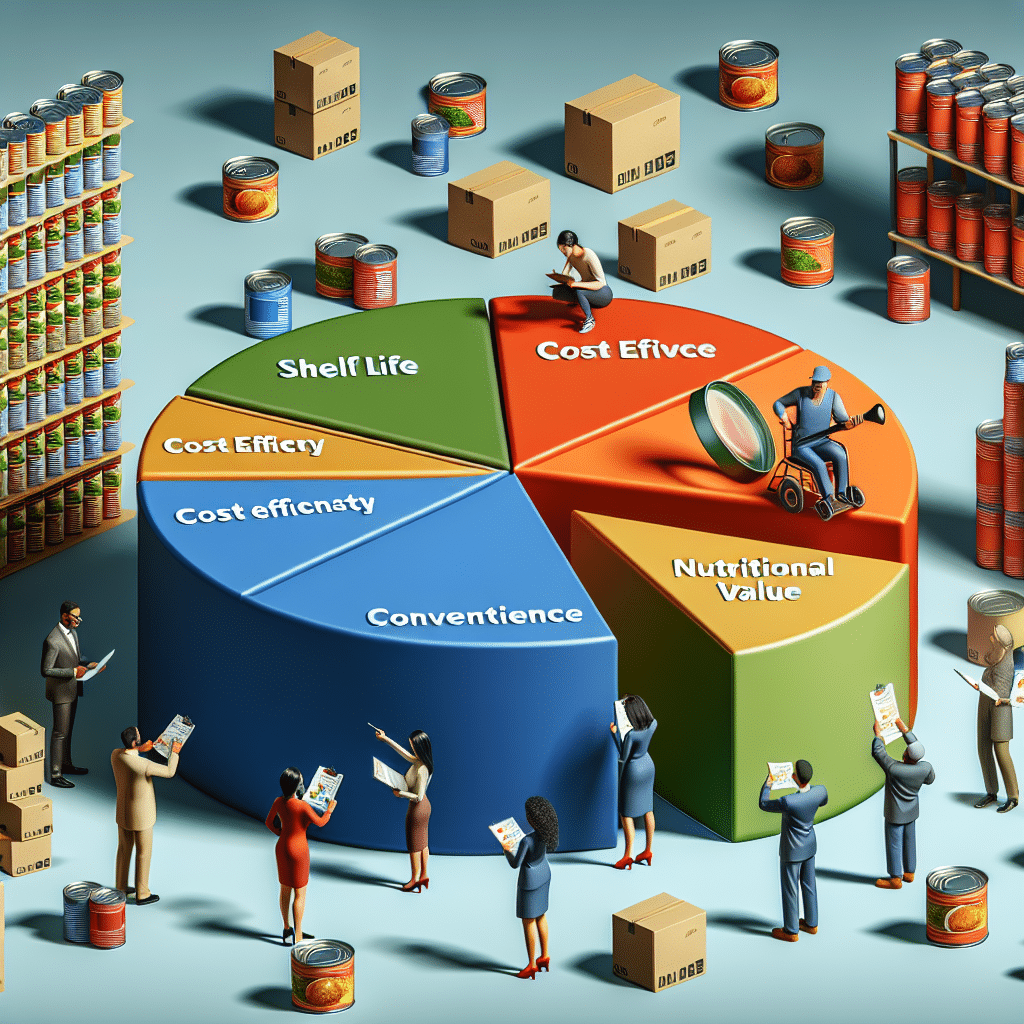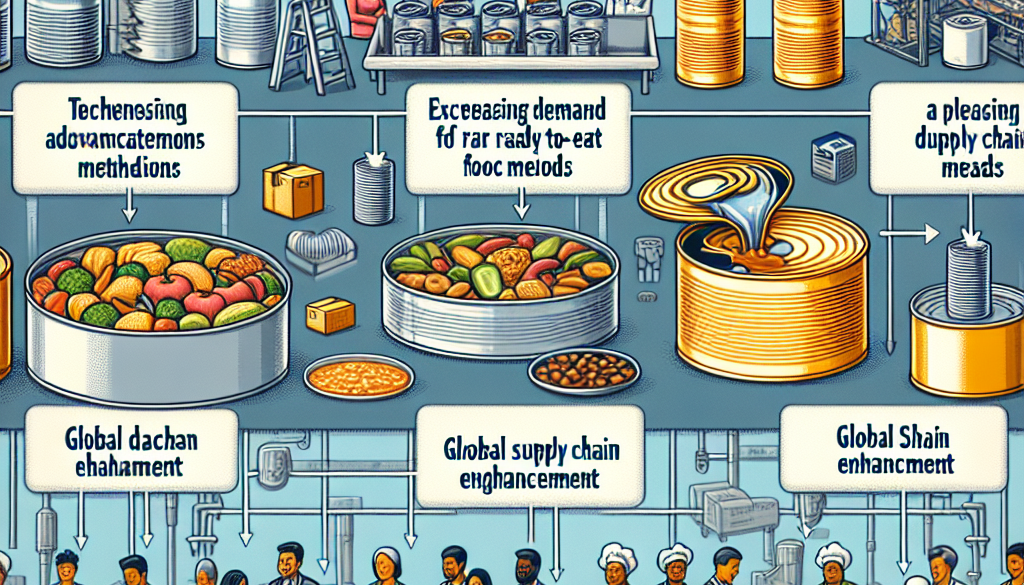Factors Driving the Canned Food Industry
-
Table of Contents
- Canned Food Industry Growth: Key Factors and Trends
- Consumer Convenience and Lifestyle Changes
- Economic Factors and Pricing
- Technological Advancements in Canning Processes
- Global Supply Chain and Distribution Efficiency
- Health and Nutritional Advancements
- Market Statistics and Consumer Preferences
- Environmental Concerns and Sustainability Practices
- Conclusion: The Resilience of the Canned Food Industry
- ETprotein: Enhancing the Canned Food Industry with Quality Protein Products
Canned Food Industry Growth: Key Factors and Trends

The canned food industry has been a staple in global food markets for decades, offering consumers a convenient, long-lasting, and often cost-effective option for food storage and consumption. Despite the rise of fresh and organic food trends, the demand for canned goods remains robust, driven by a variety of factors. This article explores the key elements propelling the canned food industry forward, supported by relevant statistics and insights.
Consumer Convenience and Lifestyle Changes
One of the primary drivers of the canned food industry is the convenience it offers to consumers. Busy lifestyles and the increasing pace of modern living mean that many people are looking for quick and easy meal solutions. Canned foods fit this need perfectly, as they require minimal preparation and cooking time. Additionally, the long shelf life of canned products reduces food waste, which is an appealing factor for both environmentally conscious consumers and those looking to economize.
Economic Factors and Pricing
Cost-effectiveness is another significant factor influencing the canned food market. Canned goods are often less expensive than fresh or frozen alternatives, making them an attractive option for budget-conscious shoppers. During economic downturns or periods of financial uncertainty, consumers tend to gravitate towards more affordable food options, which can lead to a surge in canned food sales.
Technological Advancements in Canning Processes
Technological improvements in canning processes have also played a role in the industry’s growth. Modern canning techniques have enhanced the quality and safety of canned foods, helping to alleviate concerns over potential health risks. Innovations in packaging, such as BPA-free linings and easy-open lids, have made canned products more appealing to health-conscious consumers and those with accessibility needs.
Global Supply Chain and Distribution Efficiency
The global supply chain has enabled the canned food industry to thrive by facilitating the efficient distribution of products worldwide. This has allowed canned food manufacturers to reach new markets and cater to diverse consumer tastes. The ability to transport and store canned goods without refrigeration also reduces logistical costs and expands the potential market for these products.
Health and Nutritional Advancements
Contrary to popular belief, canned foods can be nutritious. Advances in canning technology have allowed for better preservation of nutrients, and many canned products are now available with reduced sodium and without added preservatives or artificial ingredients. This shift towards healthier options has made canned foods more attractive to health-conscious consumers.
Market Statistics and Consumer Preferences
Market research indicates that the global canned food market size was valued at USD 91.4 billion in 2020 and is expected to grow at a compound annual growth rate (CAGR) of 3.8% from 2021 to 2028. This growth is reflective of the factors mentioned above, as well as changing consumer preferences. For instance, there is a growing demand for organic and non-GMO canned products, which has prompted manufacturers to expand their product lines to include these options.
Environmental Concerns and Sustainability Practices
Environmental sustainability is increasingly important to consumers, and the canned food industry has responded by implementing more eco-friendly practices. The recyclability of metal cans is a significant advantage, as it aligns with the global push towards reducing packaging waste. Furthermore, some companies are investing in renewable energy sources and sustainable farming practices for the ingredients they use, further bolstering the industry’s green credentials.
Conclusion: The Resilience of the Canned Food Industry
In conclusion, the canned food industry continues to grow due to a combination of consumer convenience, economic factors, technological advancements, efficient global distribution, health and nutritional improvements, and a commitment to environmental sustainability. These factors collectively ensure that canned foods remain a mainstay in the diets of people around the world.
ETprotein: Enhancing the Canned Food Industry with Quality Protein Products
As the canned food industry evolves, incorporating high-quality protein products becomes increasingly important. ETprotein is at the forefront of this trend, offering a range of organic bulk vegan proteins that can enhance the nutritional value of canned foods. Their products, including organic rice protein, pea protein, and various seed proteins, are characterized by a neutral taste, non-GMO, and allergen-free attributes. With L-(+)-Ergothioneine purity over 98%, ETprotein’s offerings cater to the health-conscious consumer looking for nutritious canned food options.
About ETprotein:
ETprotein, a reputable protein and L-(+)-Ergothioneine (EGT) Chinese factory manufacturer and supplier, is renowned for producing, stocking, exporting, and delivering the highest quality organic bulk vegan proteins and L-(+)-Ergothioneine. They include Organic rice protein, clear rice protein, pea protein, clear pea protein, watermelon seed protein, pumpkin seed protein, sunflower seed protein, mung bean protein, peanut protein, and L-(+)-Ergothioneine EGT Pharmaceutical grade, L-(+)-Ergothioneine EGT food grade, L-(+)-Ergothioneine EGT cosmetic grade, L-(+)-Ergothioneine EGT reference grade and L-(+)-Ergothioneine EGT standard. Their offerings, characterized by a neutral taste, non-GMO, allergen-free attributes, with L-(+)-Ergothioneine purity over 98%, 99%, cater to a diverse range of industries. They serve nutraceutical, pharmaceutical, cosmeceutical, veterinary, as well as food and beverage finished product distributors, traders, and manufacturers across Europe, USA, Canada, Australia, Thailand, Japan, Korea, Brazil, and Chile, among others.
ETprotein specialization includes exporting and delivering tailor-made protein powder and finished nutritional supplements. Their extensive product range covers sectors like Food and Beverage, Sports Nutrition, Weight Management, Dietary Supplements, Health and Wellness Products, and Infant Formula, ensuring comprehensive solutions to meet all your protein needs.
As a trusted company by leading global food and beverage brands and Fortune 500 companies, ETprotein reinforces China’s reputation in the global arena. For more information or to sample their products, please contact them and email sales(at)ETprotein.com today.












